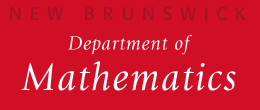The formal requirements for students in the honors track are divided into three main groups of courses:
- 100-200 level courses. There are five required courses: the four semester calculus sequence and 250. Many honors students will receive AP credit for one or more of the calculus classes. honors track students should take honors sections of the calculus course; exceptions will be made to this requirement on a case-by-case basis. Honors track students should, if possible, choose one of the MATLAB sections of 250.
- The seminar requirement.
- Courses at the 300 level or higher. Students are required to take 9 upper level courses. As described below, each student's program of study must be approved by the honors track committee.
A major part of the program is the requirement to take
two rigorous semesters of Real Analysis (chosen from
411,412,501,502) and Algebra (chosen from 451,452,551,552).
Honors track students will normally take one (or, rarely, both)
of the sequences 411-412 and 451-452 during their junior year.
Also, on rare occasions,a student may take one of these sequences in their
sophomore year.
Students will receive individual advice from their advisors
and the honors track committee about when to take these.
Students should prepare for these sequences during their 2nd year. The standard preparation is to take 300H, the honors section of 300, in the fall, followed by the freshman/sophomore honors seminar 196 in the spring. This class is designed to prepare students for these sequences. Alternatively, a student may take 300 in the spring (when there is no honors section) and take one of the courses 311,351 or 350 in the fall. Students demonstrating a strong background in doing mathematical proofs may request a waiver of the 300 requirement, and substitute another upper level course for it.
Many students find it useful to take 351 and/or 350 in preparation for 451/452, and to take 311 and/or 312 in preparation for 411/412.
The appropriate course plan for a student depends on a number of factors, and each student should discuss their plans with a member of the honors committee, and/or their honors track advisor.
Students should also normally take a semester of complex analysis (403 or 503) and a semester of probability (477). Students planning to go to graduate school should also normally take Topology (441) since it is a prerequisite for many graduate classes.
The honors track is designed so that students will be prepared to take some of graduate courses in mathematics in their senior year. Taking some graduate courses (suitably chosen) is generally encouraged, though not required for the program.
Preparing and submitting your Plan of Study During the semester following their acceptance into the honors track, the student and their honors track advisor are expected to prepare a plan of study to be submitted to the honors track committee for approval.
The plan of study provides a tentative plan of the courses the student will take as part of the honors track. Of course, it is generally impossible to make a full plan since the courses a student will take may depend on what they learn from their current courses. So the initial plan can be somewhat vague about the future, and revised as needed, subject to committee approval.
The plan of study can be fairly informal. After preparing it and reviewing it with your advisor you should email it to the chair of the honors committee. Here is a suggested format.
- Your name
- Your expected graduation year
- Your major(s) (Mathematics or Mathematics +
- Your advisor
- Your plans/goals beyond Rutgers (e.g. graduate xchool in Math or some other field, employment in some field)
- A list of all courses in Mathematics at the 300 level or higher that you have taken already (including the semester the course was taken and instructor)
- A list of Mathematics courses you plan to take with the semester. This list may not be final. Your plan for the coming semester should be close to final. For subsequent semesters the plan will be less final, in which case you may want to include some possibilities you are considering (with a few sentences of explanation, if needed).
- Any courses in other departments with significant mathematical content that you think may be relevant.








